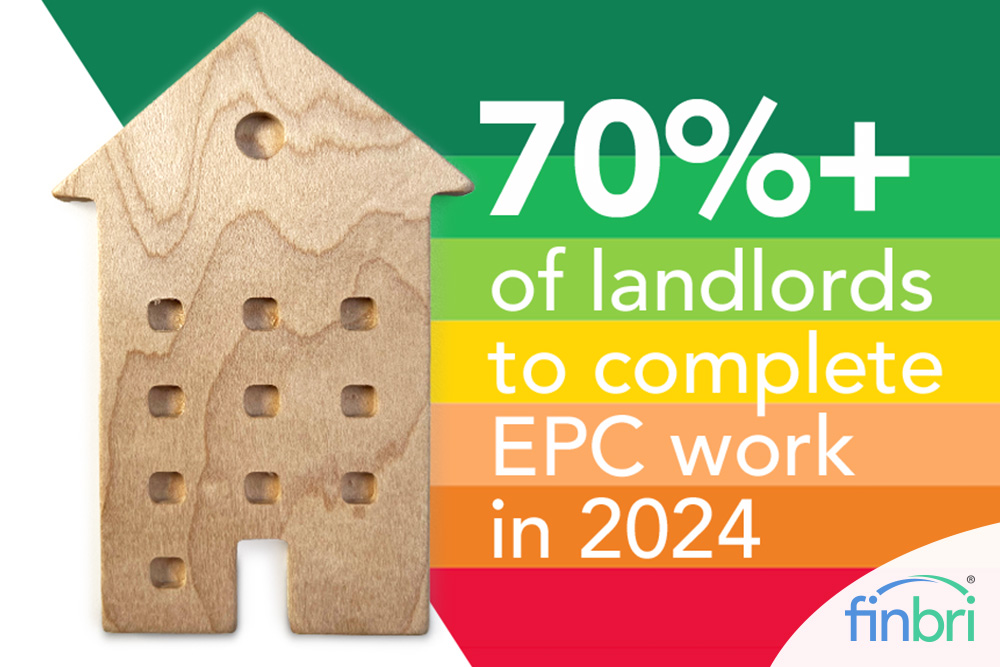On this page
What are the new EPC requirements for landlords? What are Energy Performance Certificates (EPC)? What are the current EPC guidelines and proposed changes? What does an EPC check involve? What are the benefits of completing EPC work? 11 Ways you can increase your EPC rating How can EPC improvements be funded?What are the new EPC requirements for landlords?
As of 2028, landlords' properties must have an Energy Performance Certificate (EPC) rating of ‘C’ or above. This was previously slated for 2025.
Despite the proposed changes in EPC legislation being scrapped, over 70% of landlords intend to complete EPC improvements to their rental properties this year.

What are Energy Performance Certificates (EPC)?
Energy Performance Certificates (EPCs) show how energy-efficient a property is. The ratings range from A (best) to G (worst), and an EPC is required when selling, renting out, or building a new property. Once issued, an EPC is valid for 10 years.
Our 2024 survey of 755 UK landlords discovered that 73% intend to complete EPC improvements to their rental properties this year, an increase from the 68% of landlords that intended to complete energy efficiency improvements in 2023.
What are the current EPC guidelines and proposed changes?
Current government regulations require all rental properties to have an EPC rating of E or higher.
In late 2021, the government updated the Minimum Energy Efficiency Standards (MEES) for England and Wales, stating that
- all rental properties will need an EPC rating of ‘C’ or above as of 2025
- similar changes will come into effect to include all tenancies in 2028
With potential fines of up to £30,000 for failing to meet the new standards, landlords were finding themselves under pressure to ensure their rental properties achieved the ‘C’+ rating by 2025.
But in September 2023, Prime Minister Rishi Sunak scrapped the proposed energy efficiency targets for households and rental properties, which may have surprised some landlords (although it probably shouldn't have been too much of a shock).
With the proposed changes scrapped, landlords are currently under less pressure. As of 2028, their properties must have an EPC rating of ‘C’ or above.
What does an EPC check involve?
An EPC check involves evaluating your property's energy performance by a certified energy assessor to establish its energy efficiency. The assessment includes inspecting various factors such as the age, construction, and size of your property, the heating system, any types of insulation, the energy efficiency of lighting, and the quality of windows, such as whether they’re double-glazed.
Typically, the assessment costs between £60 and £120, depending on the property size and location. The checks take about half an hour to complete, and the EPC is issued within up to three days.
What are the EPC requirements for landlords?
The Minimum Energy Efficiency Standards (MEES) were introduced on April 1, 2018. They required all properties being let or sold in England and Wales to have a minimum EPC rating of ‘E’ or above.
By law, landlords are required to provide tenants with a valid EPC at the beginning of a new tenancy. If the property has no valid EPC rating of ‘E’ or above, it cannot be legally let.
How will EPC ratings change for landlords in 2025?
The government has scrapped the previous changes set for 2025. As of April 2024, no EPC ratings changes for landlords are scheduled for 2025.
The previously established rule (all rental properties will need an EPC rating of ‘C’ or above as of 2025) remains.
However, with the next general election no later than 28 January 2025, EPC requirements for landlords in 2025 may still change depending on which party wins.
What are the benefits of completing EPC work?
Improving the EPC rating of any rental property benefits tenants in the short term and will benefit landlords in the long term.
A property's EPC score influences environmental factors and significantly impacts its market value. For instance, two similar homes can vary in price based solely on their EPC rating.
Properties with a better EPC rating are more attractive to potential buyers and tenants because they promise lower energy costs. On the other hand, properties that score poorly are likely to take longer to sell or rent out or have to charge a lower rental fee than similar properties with better ratings.
77% of landlords said that when buying a rental property, EPC ratings were either Important (45%) or Very important (32%).
When asked how important they thought EPC ratings were to their tenants, a combined 70% said they were Important (39%) or Very important (31%).
Our survey results suggest that landlords are taking EPC ratings seriously, which, when considering current energy costs, is something renters should be pleased to hear.
11 Ways you can increase your EPC rating
Increasing a property's Energy Performance Certificate (EPC) rating involves making it more energy efficient and reducing its overall environmental impact. Here are some effective ways to increase your property's EPC rating.
1. Insulate hot water cylinders
A hot water cylinder jacket will reduce standby heat losses by 25%–45%. It should save you between 7% % and 16% in water heating costs and pay for itself within a year. This is another quick and affordable improvement.
2. Insulate walls
Consider adding insulation to both walls and the roof for maximum efficiency gains. Depending on your property type, this might involve cavity or solid wall insulation. Cavity wall insulation could save you up to £145 annually and enhance energy efficiency by around 25%.
3. Install roof or loft insulation
Approximately a quarter of home heat escapes through the roof if not insulated. Investing in loft insulation would also boost efficiency by about 25%, costing anywhere from £300 for professional installation, and could reduce energy bills by £315 per year.
4. Install draftproofing
Sealing gaps around windows, doors, and floorboards can help prevent heat loss and make the heating system more efficient.
5. Install Double or Triple-Glazed Windows
Investing in double or triple-glazed windows will enhance comfort levels and reduce heating bills. Consider replacing them with double-glazed ones, which can bump up your EPC rating by another quarter - at an estimated cost range from approximately £4,500 and upwards based on size and number replaced.
6. Upgrade gas boilers
Gas boilers over 10 years old are likely to be inefficient. A modern condensing boiler can be up to 34% more efficient and significantly improve your EPC rating. Plus, a new boiler means less risk of costly breakdowns. Depending on the make and model, a boiler upgrade (boiler and fitting) typically costs around £4,000.
7. Switch to LED lighting
Switching to energy-efficient lighting, such as LED bulbs, reduces electricity usage and costs. You can save £2-3 per year for every traditional halogen bulb you switch to a similarly bright LED bulb. If the average UK household replaced all of their bulbs with LEDs, it would cost about £100 and save about £40 a year on bills.
8. Install smart heating controls
Installing programmable thermostats or smart heating controls can optimise heating usage, ensuring energy is not wasted by heating the property when it's not needed.
9. Switch to Energy-Efficient Appliances
Replacing old appliances with more energy-efficient ones with a higher Energy Star rating will decrease overall energy consumption.
10. Switch to a renewable energy systems
Solar panels are the prevailing choice for residential renewable energy, and after the initial installation expense, they can substantially cut down energy bills. The installation cost for solar panels is estimated at £5,500. Once they are up and running, you can expect annual savings of about £325. Wind turbines, or air-source heat pumps, can also significantly increase a property's EPC rating by generating renewable energy and reducing reliance on non-renewable power sources.
11. Install green roofs or walls
Green roofs or walls can improve a building's insulation, help regulate the temperature, and reduce energy use. This is easier to consider at the planning stage of a new build rather than retrofitting an existing property.
Each of these improvements can help raise a property's EPC rating and contribute to long-term savings on energy bills. The impact on the EPC rating will depend on the property's current state and the improvements implemented.
How can EPC improvements be funded?
With 74% of UK landlords owning 2 or more properties actively rented out, EPC improvement costs can be significant across a landlord's portfolio. And the more properties a landlord owns, the more expensive the total EPC improvements will be. There are several different ways in which landlords can pay for EPC improvements.
Financing options for improving your EPC
Reserve savings
Using your cash reserves is the cheapest way to pay for any purchase. Cash may be the most cost-effective option, but it is often tied up and not quickly available.
Personal loan
A home improvement loan is a personal loan used to fund refurbishment projects on rental properties. If a landlord owns their rental property (or properties) in their own name, they may choose to take out a personal loan to fund their EPC improvements. These loans are typically suitable for less expensive EPC improvements for landlords with 1 or 2 properties. Personal loans generally offer competitive interest rates and flexible repayment terms and do not require collateral. The loan amount and interest rate depend on the landlord’s credit score and financial history.
Business loan
A record 50,004 limited buy-to-let companies were set up across the UK in 2023, an increase of 3% from 2022's previous record of 48,540. More landlords are choosing to operate as businesses. Business loans can provide more significant financing than personal loans, which is beneficial for making substantial property upgrades across multiple properties. Interest on these loans is also tax-deductible as a business expense. These loans may require the business to have a proven financial track record, such as 3 years of full accounts, and collateral may be required. The terms and loan criteria can also be more complex than personal loans.
Bridging finance
Our landlord report uncovered that 74% of landlords own 2 or more properties they actively rent out. 28% of landlords own 2 rental properties, whilst 26% own 1. With the high costs typically associated with meeting the mandatory EPC standards, landlords with multiple properties are increasingly exploring funding alternatives like bridging finance. Bridging finance offers landlords a fast way to fund their property upgrades. It provides quick access to funds, allowing you to make improvements promptly and with minimal disruption to your tenants.
Why you might consider bridging finance for EPC improvements
Bridging finance may be beneficial if you require fast access to significant funds for your EPC improvements, especially if you have multiple rental properties.
Rapid Access to Funds. Bridging finance is typically significantly faster to arrange than traditional buy-to-let remortgages, meaning you can access the funds quickly and improve energy efficiency sooner.
Multiple Properties & Substantial Improvements Needed. Landlords requiring improvements on several properties may consider bridging finance to cover these costs - the more expensive upgrades add up and could cost £10-£25k per property.
Minimised Tenant Disruption. Bridging finance allows you to finance property improvements without causing significant disruptions to your tenants. Since these loans are short-term, you can complete the upgrades quickly and potentially minimise the inconvenience to your tenants.
Bridging finance can provide quick access to funds for energy-efficient upgrades, ensuring your property remains attractive to tenants and future-proofing it against potential regulatory changes.
Landlords will be closely watching the build-up to the forthcoming general election for any possible government changes in case the EPC requirements for rental properties are changed again.
Final thoughts
Despite the immediate urgency to upgrade EPC ratings for their rental properties being scrapped, 70% of landlords still intend to complete some form of EPC work in 2024.
As a combined 74% of landlords own 2 or more properties they actively rent out, those that require costly EPC work are likely to look towards sourcing funding for the improvements.
During a cost of living crisis, with energy bills increasing when tenants are struggling financially, the news that so many landlords will be completing work to improve their properties’ energy efficiency will be welcome for tenants throughout the UK.





